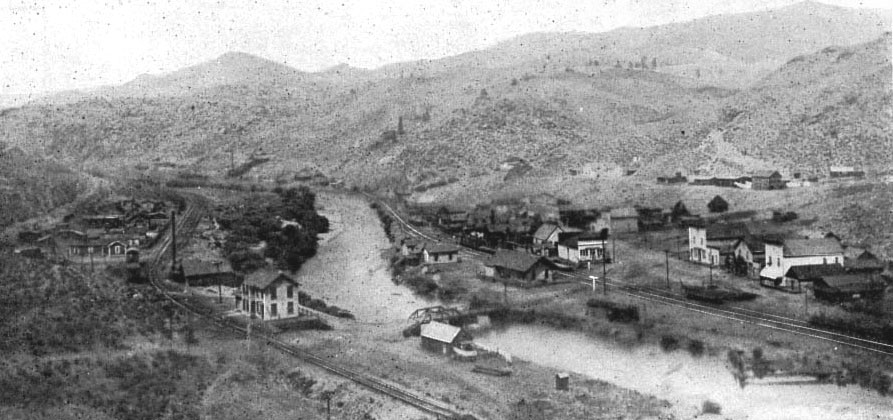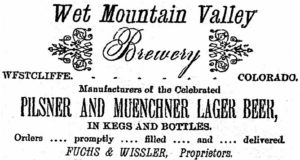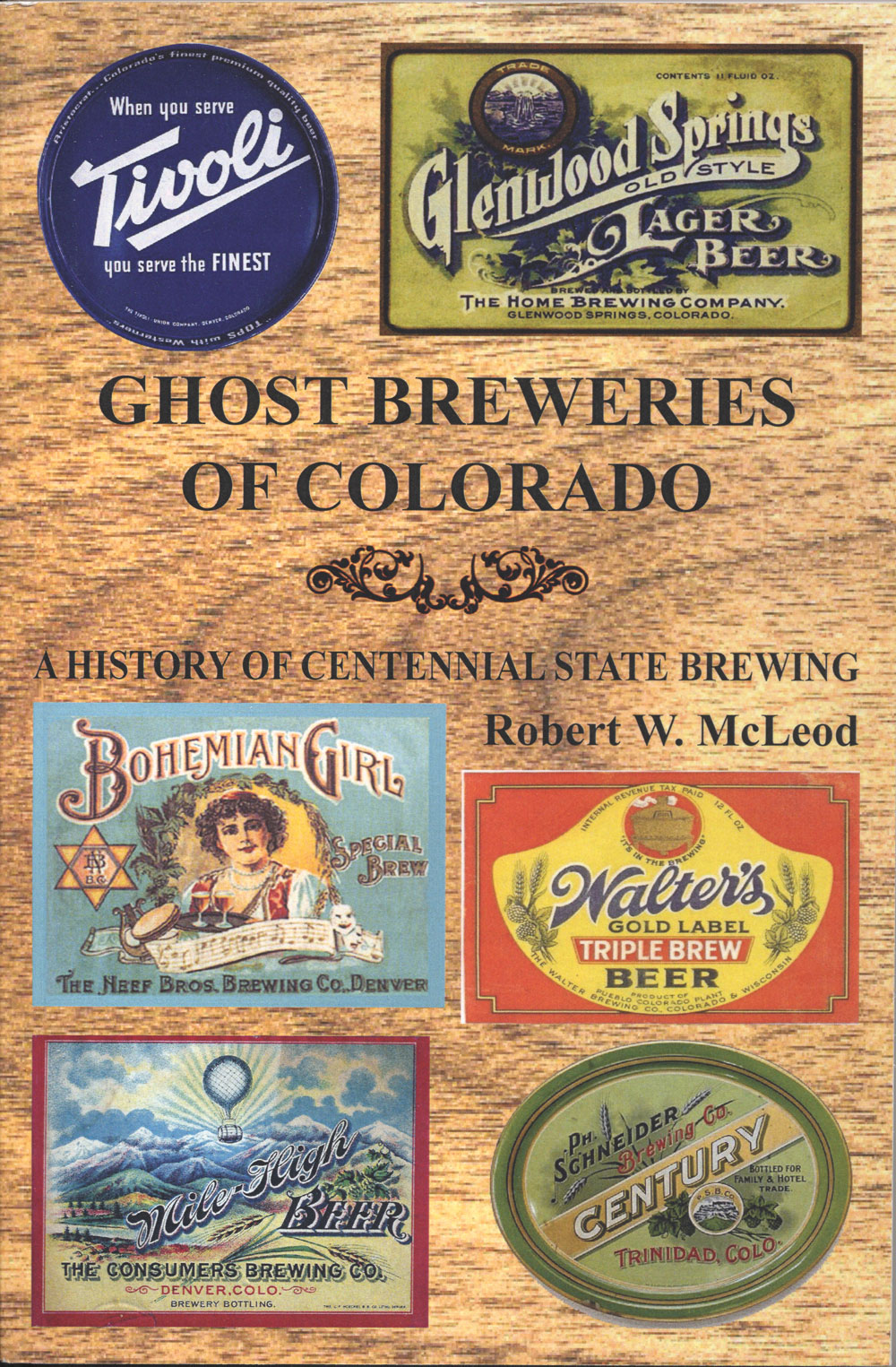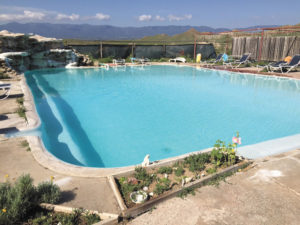 By Robert McLeod
By Robert McLeod
The following are two excerpts from a new book, Ghost Breweries of Colorado, A History of Centennial State Brewing, by author Robert W. McLeod of Arvada. He is also the author of A Colorado Chronology, a collection of several thousand nuggets of Colorado history and A Valley So Grand, a history of the Grand Valley and Grand Junction, Colorado. He’s had a forty-plus-year association with Denver’s Sundance Publications, Ltd., as an editor and in other capacities. He is currently working on a book with the Colorado Railroad Museum about the Arkansas Valley Railway, Colorado’s first abandoned railroad. Ghost Breweries is available for purchase through amazon.com, createspace.com or through eBay.
 WET MOUNTAIN VALLEY BREWERY
WET MOUNTAIN VALLEY BREWERY
The principals of this establishment, located on Grape Creek southwest of Westcliffe, were George Carl and Servatius Daemgen. Its construction was well under way, “with foundations up and lots of lumber on the ground,” by June 22, 1892. A subsequent report stated the brewery was rapidly nearing completion August 24, 1892. The brewery was in full operation producing about 30 barrels daily by January 25, 1893, and planning to supply high quality malt to breweries in Denver and Pueblo.
Talking with Mr. Geo. Carl, of the new brewery, the other day we learned that it is the intention of the establishment to keep from $10,000 to $15,000 in the county that is now went out for beer each year, yet the chief object is to manufacture malt to be shipped to other breweries. No grain will grow so well and good in this Valley as barley, and the barley grown here is of better quality than even the celebrated Canadian product. This has been demonstrated by careful tests by the brewer’s association at Chicago. The new plant referred to will consume about $15,000 worth of barley each year. What a great thing for this Valley.
The brewery was to be officially opened for business July 1, 1893, as stated by the Silver Cliff Rustler on page one of its June 28, 1893, issue. Before the close of the year:
Mr. Jacob Beck has purchased Mr. Demgen’s [sic] half interest in the Wet Mountain Valley Brewery, and entered into full partnership with Mr. Carl on Oct. 1st. We predict a prosperous career for the new firm. Success to you.
Mr. Jacob Beck, of the brewery firm, has purchased the D.&R.G. Section house and is having it moved near the brewery. He will have it fitted up for a nice residence for himself and family.
Just after Christmas that year a man arrived from Golden to look into purchasing Carl & Beck’s brewery, but nothing further was reported on the subject.
Events for the year 1894 included the addition of bottling machinery. Jacob Beck sold his interest to Servatius Daemgen, and once again Carl & Daemgen were in charge. Beck apparently found partnership in the brewery very distasteful, as he afterward ran numerous notices in the local paper stating he had divorced himself from any further association with the enterprise. Beck’s dissatisfaction aside, the brewery was quite successful and improvements were in order:
The Wet Mountain Valley Brewery is doing a splendid business and has about $3000 worth of beer and malt on hand. The fame of this excellent beer is going abroad and the owners – Messrs. Carl and Daemgren [sic] are now delivering to Bradford, Harms, Wetmore, Greenwood and other points, as well as to Silver Cliff, Querida, Westcliffe, Rosita, et al.
The following year, improvements continued to be paramount:
The Wet Mountain Valley Brewery is undergoing improvements in the way of new paint, handsome sign, &c. Messrs. Carl & Demgen [sic] are full of enterprise and Custer county beer consumers should patronize this excellent home enterprise.
 Rosita News (copied from Rosita paper)
Rosita News (copied from Rosita paper)
A young man by the name of Boller who has been sojourning in Silver Cliff the past week or two returned a few days ago, and opened our eyes with a description of the many advantages of that City. Among them a beer pipe running from the brewery straight up Ohio Street which was to have been tapped in the near future.
On February 11, 1896, Fred Ackelbein sold his Westcliffe saloon to Carl & Daemgen for use as the Wet Mountain Valley Brewery retail outlet and the men took possession April 1. In July it was rumored that a Mr. Mashburn would move his distillery from the town of Greenwood, about 25 miles east of Westcliffe, into the Wet Mountain Valley Brewery. The move did not come to pass.
What did come to pass, however, was a constant procession of ownership exchanges until the brewery finally closed. George Carl bought out Daemgen’s half interest and became the sole owner in 1896. Next, Felix Hallaner took over operation and Carl moved his family to Silver Cliff. In April 1898 the brewery changed hands completely with Hallaner giving over his interests to Leonard Fuchs and Anton Wissler. Servatius Daemgen again entered the picture when he purchased the half interest owned by Leonard Fuchs in March 1899. Martin Walter, of Pueblo’s Walter Brewing Company, visited town in mid-February 1902 with an eye to purchase the Wet Mountain Valley Brewery but no deal was struck.
During a windstorm the smokestack at the brewery was blown down and the stables belonging to the company were badly damaged.
Daemgen proceeded, in 1902, to sell his interest to Peter Becker, who then moved his family from Central City and shared ownership with Wissler, who moved his family from Westcliffe to the residence at the Wet Mountain Valley Brewery.
In the early months of 1905, Wissler was struggling to keep the brewery open. In an effort to bring in more income, he began advertising, in the Wet Mountain Tribune, that he had chop-ground rye for sale at the brewery. The Tribune’s editor, Alexander H. Lacy, in recognition of Wissler’s contributions to the community, published the following blurb of praise:
Tony Wissler, of the Rocky Mt. Brewery, is not only public spirited but somewhat imbued with philanthropy. Since the big snow he has constructed a heavy snow plow, to which he has attached his work horses and drawn it through our streets, nor has he overlooked the residence part of our town. The paths he made lead to the school house and churches. Tony is entitled to the thanks of the entire populace.
Anton Wissler was an avid supporter of the Custer County band, and a dance to garner support for it was held at the brewery the evening of May 6, 1905. The Silver Cliff Rustler reported the dance “did not attain to a very high degree of success, – there was only one fight. Shame! Shame!” Not long after this dance Wissler took over the beer hall of Lou E. Wolff in nearby Silver Cliff. He held his grand opening July 1, 1905, with “a bountiful lunch and Coor’s cool beer.” Wissler had become the local agent for Coors and was storing it in the large cellars at the Wet Mountain Valley Brewery which was apparently no longer producing beer.
It is probable that the final official function at the brewery occurred on Saturday evening, July 28, 1906. A newspaper notice of the event admonished, “No liquor of any kind will be sold or given away. Tickets per couple 50cts, lunch included.” It appears that even before Prohibition became a local option in Colorado in 1907, Custer County or Westcliffe itself chose to become “dry.” Despite the lack of liquor, the dance was reported as well attended and enjoyable.
The brewery just faded away. One final mention stated that a youngster named Geo. Fuch fell from the building’s roof while playing and was not seriously injured.
[InContentAdTwo] GRANITE
With the discovery of gold at Leadville, placer mining camps began to sprout along the course of the Arkansas River between the Mosquito and the Sawatch mountain ranges. The community of Cache Creek, established in 1860, was one of the earliest, and rapidly reached a population of 300. A short distance upstream, Granite sprang into being the following year and eclipsed the inhabitants of Cache Creek by nearly 3,000. The settlement sprawled three miles along the Arkansas and two miles up Cache Creek. A quartz mill was completed and put into production in 1868, the year Granite captured the Lake County Seat from Dayton.
At about this time a journalist, writing under the pen name Nil Desperandum, visited the flourishing community to report on its progress and found a brewery under construction:
After crossing the bridge over the Arkansas and making a left turn, one was on the town’s main street [today Chaffee County Road 397] which paralleled the Arkansas. At the north end were located the foundations of a brewery.
In 1880, F.W. Salem published a book entitled; Beer, Its History and Its Economic Value as a National Beverage. For the period 1878-1879, the book indicates that two men named Mesch & Gerter [sic Gerster] brewed 11 barrels of beer in 1878 and 155 barrels in 1879. By the time the 1880 census was enumerated Mesch was no longer involved. The 1880 Colorado State Business Directory indicates the proprietors of this establishment as being John Gerster and William Jesse. Gerster, who may have brewed in Granite as early as 1864, was a married 63-year-old of German birth. Jesse, 50 years old and also born in Germany, immigrated to America in 1858 and was single. He eventually became a farmer in La Plata County near the town of Columbus.
Beginning in 1879, impossibly large Lake County was gradually reduced in size by dividing it into smaller counties – Chaffee, Gunnison, Hinsdale , La Plata, Ouray, Saguache and San Juan. Granite became the seat of newly-created Chaffee County. Having no court house in which to hold assemblies, the first meeting of the Chaffee County Commissioners was held on the brewery’s second floor but in 1880, Buena Vista wrested control of the county from Granite. It was coincidentally the final year the brewery was in production.



